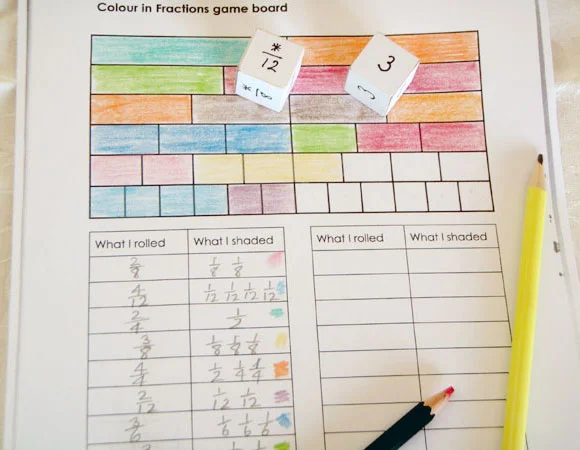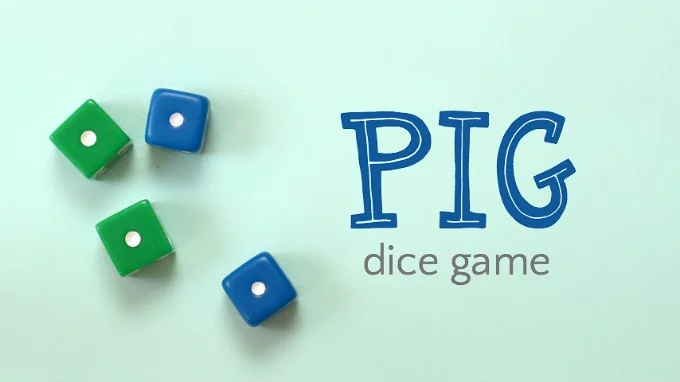Last week we looked at a great game for fractions, one of the most complex aspects of numerical reasoning that your child will experience in elementary school.
This week, we zoom all the way back to the foundation of all other numerical reasoning: counting.
Before you had kids, you might have thought that counting was an easy, natural thing to learn. At least, that's how I felt.
But as I watched my son race his way through the numbers, counting "onetwothreefourfivesixseven" as he pointed to the five goldfish on his plate, I realized there was a lot more depth to counting than I had realized.
Count Your Chickens, this week's game recommendation, is a great way to see your preschool child's progression with counting, and a springboard to even deeper mathematical questions.
One reason that games make such great teaching tools is that they give kids a reason to care about the math they are using.
Hand a kid a worksheet full of multiplication problems, and they might balk. But play a game where multiplication is used to calculate the score, and suddenly they have a desperate need to find out what 6*8 is.
Similarly, football fans in 3rd grade are lucky: the 7s times table, notoriously the most difficult to memorize, is a breeze if you've spent the past few years counting touchdowns. Whats 5*7? That's just five touchdowns: 35 points.
Anyway, ever since I launched this newsletter I've been looking for a game that would be fun and strategic, yet help kids grapple directly with the most challenging topic in elementary math: fractions.
I think I found that game. I've seen it by a couple names, but I'll just call it Fraction Fill-In.
One of my very first recommendations was the card game SET. As I shared, I love this game because it plays well with almost any age and almost any amount of people.
In my original newsletter, I shared the basic mechanics of the game, as well as some basic questions you could ask while playing. I was pretty happy with the ideas I had recommended
Then I met Amie Albrecht.
As a kid, I always loved the game show Lingo. In the game, players would have five chances to guess a five-letter word. After each guess, their word would light up to let them know which letters were correct, and which letters were in the word but in the wrong position.
These little deduction puzzles are a great way for kids to think strategically, so I perked up when I found a nice mathematical variation: What's My Number?
This is another one of those games that you can pull out in a waiting room or at a restaurant, rather than simply surrendering your phone to your kids. All you need is a piece of paper and a pencil.
Some of the games I recommend are definitely for older kids.
But at the heart of Games for Young Minds is the idea that kids should be having mathematically rich experiences from an early age.
Which is why I'm so happy to discuss this week's recommendation. Pattern Play is a game that a two-year-old can enjoy playing with, yet the math ideas are rich enough to keep much older kids happily occupied as well. It's the first game that I've seen my 1 year old baby drawn to at the same time as my kindergartner.
Let's check it out!
My son has been working with addends a ton this year in school. Every so often, he brings home a math packet that is full of these things called number bonds, which help young learners break a larger number into two smaller pieces.
He's gotten pretty good at addends (probably all that dice rolling and score keeping), so I decided to give him a little puzzle to keep him occupied when his math packet feels simplistic.
I call it How Many Ways Can You Add to 10?
Ticket to Ride is a phenomenon for a reason: The game is just plain fun.
I remember when I first realized how enjoyable and versatile the game was: I brought it over to my dad's on Thanksgiving, and we played a nice, friendly face-up version of the game with my son and a couple of his cousins. Then I left the game over there that night, in case anyone wanted to play later.
The next day, my dad told me about the brutal, conniving, back-stabbing game of Ticket to Ride that the adults had played the night before.
I figure that when a game is just as fun played face-up or face-down, it's a keeper. Ticket to Ride is definitely more expensive than the typical game that I recommend, so maybe it works best as a birthday present than an impulse purchase. But it's strategically deep enough to remain a big part of your board game rotation for years.
It's not often that I find a game that I find a game that is easy to teach, free, and beloved by both my 6-year-old son and my 8th grade students.
This game is perfectly suited for a 2nd or 3rd grader who is beginning to learn about multiplication, but it's accessible for younger kids and strategically fun for older ones as well.
I found How Close to 100? through Jo Boaler's helpful site YouCubed, which has a lot of multi-age math tasks and games.
Say you have a four-year-old. She knows how to count to ten or even twenty, but you don't know what other math topics you should be helping her with. Should she learn to count to 100? To do basic addition? What's next?
The answer might be surprising: Your daughter knows how to count. Now she needs to know when to count.
Perhaps she knows the sequence of words "one, two, three" and so on, but does she know what counting is for? Why do we count? When is counting useful?
Maybe she does! But you'll never know until you ask her.
This week's game provides so many great opportunities for counting, I think it should be a mainstay in any family's playroom. It's also my daughter's favorite game to play.
Y'all wanna see a magic trick?
Alright, I have in my hands ten cards. Nothing up my sleeves. Just watch and enjoy:
If you've been reading Games for Young Minds since the beginning, you know one of my absolute favorite games is Blokus. The game is incredibly easy to learn, accessible to kids of almost all ages, and still fun for adults.
I've been wanting to share the game again, especially since my readership has grown so much since November 2017! Fortunately, I have just the excuse: Over the winter holiday, I came up with a fun, cooperative twist on the game that has been a big hit at home.
So let's visit, or revisit, one of the greatest little games out there.
Let's say I make you a wager. You roll this die a certain number of times. At the end, I'll give you $100, so long as you never roll a 1. If you do end up rolling a 1, then you have to pay me $100.
How many rolls of the dice would you risk? Surely, you'd roll once, right? After all, the odds of winning are 5 out of 6. But only a fool would roll that die 30 or 50 or 100 times in a row.
So when does some outcome change from "unlikely" to "likely"? And how can you help your kids build an intuition for that idea, before they start wasting all their money on lottery tickets?
Maybe a quick game of Pig might help.












